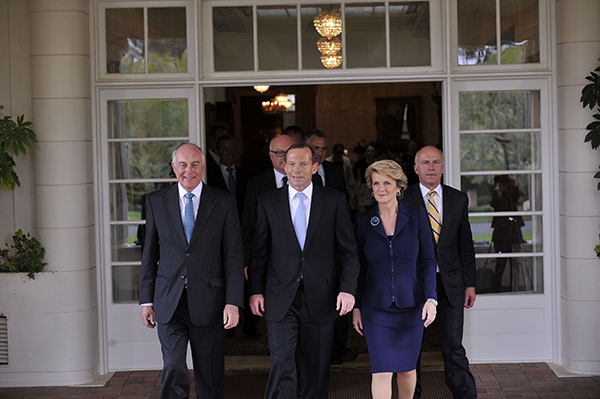February 11, 2015
Coalition is paying for failing to prosecute its case
By Professor Henry Ergas, Professor of Infrastructure Economics at SMART Infrastructure Facility
If the merest spark sufficed to set off the firestorm consuming the Abbott government, that is because so many grievances have been smouldering beneath the surface. No doubt, the circumstances the government has faced might defeat even the ablest leadership; but it is hard to deny that there have been many unforced errors, worsened by an apparent insensitivity to mounting concern in the party room, frustration among senior ministers and a deteriorating public mood.

Department of Foreign Affairs and Trade website – www.dfat.gov.au [CC BY 3.0 au], via Wikimedia Commons
The government’s lacklustre performance in explaining what should have been a compelling economic argument, at a time when explanation was desperately needed, has only deepened its woes. By not prosecuting its case, it has allowed a yawning gap to develop between what it proposes and what the country is willing to accept, compounding the sense that it is out of touch.
A number of serious policy errors have added the impression of incompetence, drowning out the substantial achievements. It is therefore unsurprising that the announcement of the knighthood for Prince Philip, followed by the LNP’s shock defeat in Queensland, would have torn the government apart.
What is surprising, however, is the real possibility of a leadership change in the midst of a Coalition government’s first term. For sure, Labor established the precedent; but it is equally certain that doing so cost it dearly.
Yet the fact that the precedent was established points to broader forces affecting all sides of politics. In virtually every advanced economy, rising levels of education, and the decline of class and religion as determinants of social segmentation, have resulted in electorates that are more footloose and more heterogeneous.
Political parties have responded to that change by soft-pedalling their core beliefs and forgoing even the pretence of ideological coherence, relying instead on the party leader as a prime source of differentiation. But once ideological coherence has been sacrificed, it is only a small step to “whatever it takes” politics, in which, as in a street gang, the survival of leaders depends less on loyalty than on immediate performance.
There is, however, an obvious tension between the turmoil that can create and parties’ desire to promise voters strong, predictable leadership. As that tension has played itself out, party after party has enacted rule changes which protect incumbent leaders.
The changes Labor adopted in 2013 are a case in point; but the trend is also apparent on the centre-right. The British Conservatives, for example, raised the bar on evicting leaders after Anthony Meyer’s “stalking horse” challenge to Margaret Thatcher in 1989, which paved the way for her ouster in 1990. Responding to continued leadership tensions in the John Major years, they then increased the hurdles again after their defeat in 1997, making it virtually impossible for a serving prime minister to be displaced.
Tony Abbott has none of those protections; yet however much he might welcome them, it is not clear that they have served parties well. That voters are more volatile than they once were may be regrettable, but it is a fact; and experience shows it makes little sense to pretend otherwise, preserving leaders the public no longer respects.
For example, the Labour Party rules that entrenched Tony Blair merely ensured discontent festered; by postponing his replacement, they contributed to Labour’s collapse in the 2010 election, which consigned the party to its second-lowest share of the vote since 1918.
In contrast, while it is unlikely Thatcher would ever have recovered from her attempt to impose a poll tax, the switch to Major allowed the conservatives to reclaim the political centre, securing in 1992 the highest popular vote recorded by a British political party in a general election to date.
That is not to suggest a change of prime minister would yield similar results here. After all, it would not solve the problem of the Senate, which has done so much to undermine the government’s agenda. Nor would it alter the economic realities which impose tough choices that voters struggle to accept. To blame Abbott for the resulting difficulties would be grossly unfair. But as John F. Kennedy observed when his planned invasion of Cuba turned into a fiasco, “nobody promised fair” — least of all voters. Rather, with the NSW election looming, the Coalition requires more than a makeover; it requires a fresh start.
Whether that is Malcolm Turnbull’s moment is plainly a matter of judgment. As Major did in Britain, he could bring the party back to the centre, while convincingly articulating the Coalition’s economic case. And his work on the national broadband network shows an ability to reach agreements the government could well use in dealing with the crossbench.
But it is the curse of regicides that they have to march into battle backwards, ever wary of being the next victim of their own crime. Adding to that is the challenge he would face in building the trust a leader needs. And for all that he may be the next Henri IV of Navarre (who, to cement his hold on the throne of France, converted to Catholicism, apocryphally saying that “Paris is well worth a mass”), Turnbull’s earlier support for the carbon tax raises obvious risks.
However, if the responsibility for making a fresh start stays with Abbott, it must not be because he was initially elected into the role but because he credibly promises to implement the far-reaching changes the situation demands.
Whether he can do so remains to be seen; but whatever the party room decides, it cannot leave the government in as terminal a state as Rudd and Gillard ever were, flailing and gasping like dying fish on the deck of a trawler. If it does, it will soon share their fate.
This article was originally published by The Australia; read the original article.